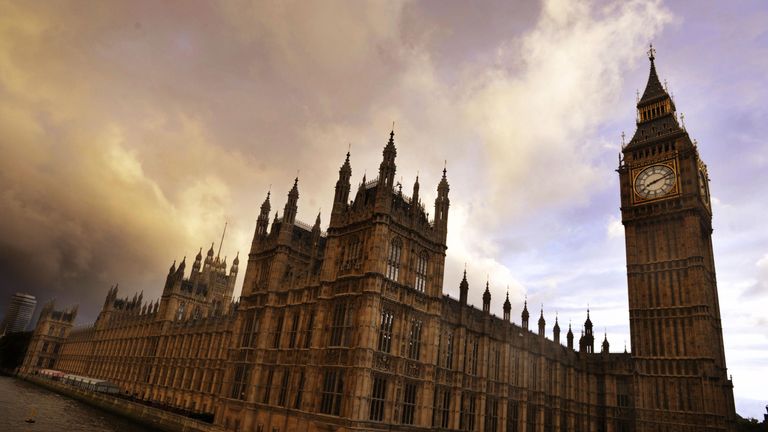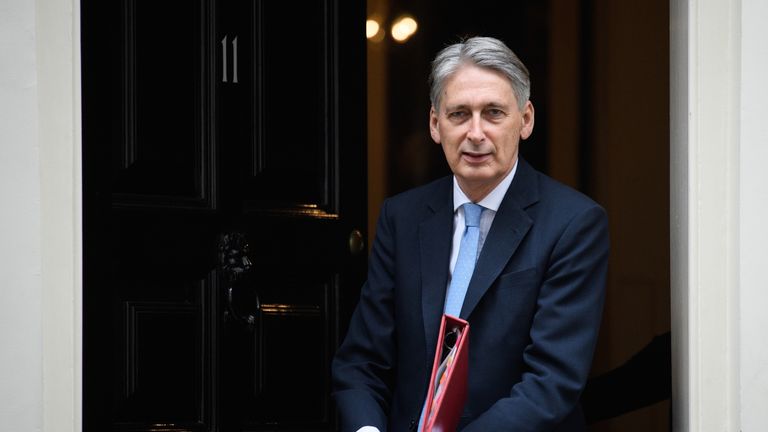Sky Views: Tory government can limp on until 2022

Thursday 6 July 2017 11:51, UK
By Lewis Goodall, Political Correspondent
"She's a dead woman walking," so opined former chancellor George Osborne about Theresa May in the hours after June's astonishing election result.
Yet, she staggers on. As one senior Tory MP told me in the days after June 8: "She'll last longer than you think."
The fact that she's in place, a whole month after the most surprising election result in a generation, already vindicates that prediction.
Many, however, forecast that this Parliament would last only a bit longer than this Prime Minister.
As the results trickled in during election night, the bien pensant view in Westminster was that there would be another election within the year.
Having had a month for the electoral dust to settle, I think that assumption was entirely wrong and that save for a Brexit upset, the next election will be on or around the last possible date it could be, May 5 2022.
This is irrespective of the fact that Theresa May will almost certainly step down and a new Conservative Prime Minister will take the reins at some point in the meantime.
Why? Well the political alchemy has transformed since the General Election, the most important bit being that which surrounds the Fixed Term Parliaments Act.
Before the election many pundits overestimated its importance. After it, the same pundits underestimate it just the same.
This is because the Fixed Term Parliaments Act doesn't matter when a Government wants an election, as the recent poll proved.
An opposition will always vote for an early chance to swap sides in the chamber, otherwise what on Earth is it for?
Given a two-thirds vote of the House of Commons is required to secure an early dissolution, you need both main parties on side. So if the Tories want an early election they can get one.
The point is; which Tory Prime Minister, under what set of circumstances, could possibly want one now or anytime in the near future - especially given Labour's recent surge in the polls?
Before 2017 the idea of Jeremy Corbyn standing on the steps of Downing St seemed a quaint impossibility. Now it keeps Conservatives up at night.
Moreover, even if the Labour Party plummeted 20 points behind the Conservatives once again, it would be a brave Tory leader who decided to go for an early election even in those circumstances.
They've been down that road before - their fingers weren't only burnt, they were set ablaze.
If a government doesn't want an early election then the Fixed Term Parliaments Act is actually a boon for a weak government.
It limits the sort of votes which can bring a governing party down to confidence votes and Queens' Speeches (of which the Government has already reduced this Parliament's number).
It would be a quisling-like act of treachery for any Conservative MP to traipse into the lobby against their party in such a circumstance, and there's no reason to suppose the DUP will put Jeremy Corbyn in Downing Street anytime soon either.
At the very least, with money flowing to Ulster as and when required, they could be persuaded not to vote against the Conservatives for this Parliament.
But then, the objection arises, how can a government exist for so long with so little mandate to do anything?
As the 1974-79 Labour government showed, parties with tiny majorities or none at all can survive for a long time.
It didn't do a great deal - it ran on fumes. But it survived and kept the other lot out.
The political survival instinct amongst MPs is strong. It's always better, even when you can't make laws, to be on the government benches and prevent the opposition from writing them instead.
In the 1970s, Jim Callaghan's government didn't have the benefit of the Fixed Term Parliaments Act restricting what was a confidence vote.
Yet, it survived for four and a half years, until deaths of Labour MPs eroded its majority.
Tory MPs don't die. No seriously, they don't. Of the 16 by-elections since 2005, 14 have been as a result of the death of Labour MPs.
It's a pattern repeated since the turn of the last century.
As the years progress, the reasons not to call the election will likely become ever the more acute.
All of the economic indicators are going south. The savings ratio is at a modern low, investment is down, real household income is squeezed, inflation is up and interest rates are almost certainly about to begin their ascent.
By 2020 we will be 11-12 years since the last recession, the economic cycle will be due for another about turn and, with few economic levers left to pull, every political incentive will exist for the Tories to play it long and hope to ride it out.
There is one big caveat to all this - if the Government loses the vote on the Brexit deal it seems inconceivable to me that there wouldn't be an election.
The Government would have no choice but to go the country to try and secure a mandate to get it through Parliament.
But if the Government can navigate its way through that Brexit vote - possibly with a Norway-style deal which attracts Labour MPs - then keen lovers of elections like me will be keeping their swingometers in the cupboard.
Sky Views is a new series of comment pieces by Paste BN editors and correspondents, published every weekday morning.
Previously on Sky Views: Sam Kiley - Why beating IS won't change much






